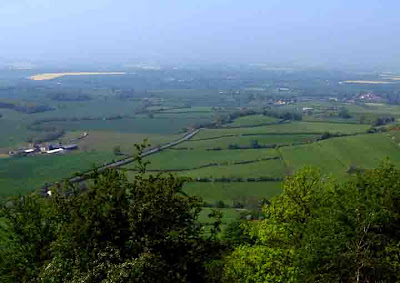 |
| Gazing out upon Herriot Land from a recently built viewing platform. |
At The World of James Herriot in Thirsk, the museum showed a
short movie about Alf Wight (aka James Herriot). Christopher Timothy, the actor who portrayed
him in the TV series “All Creatures Great and Small,” acted as our narrator. In the movie, they showed the memorial
service that took place in St. Mary’s Church in Thirsk. Unlike the day that James and Helen (or Alf
and Joan) married, this time the church looked full. The actors from the series, including
Christopher Timothy, sat in one row near the pulpit. I found myself wishing I had been able to
attend, or at the least, watch more of the service. I can imagine that those who attended, who
knew and loved the man, or had come to know him through his writing, found the
service meaningful.
“Doctor Who, are you reading?”
Hmm…. All right.
In “Awake With Connie Willis And Amaryllis,” I wrote about a
family member who passed away.
Sadly, due to the distance involved, I was unable to attend her memorial
service. But I recently had the
honor of attending a celebration of her life. Photographs depicted her with family, friends, at significant events or trips, and pursuing the activities she enjoyed. People shared memories of her that they will treasure
forever. This time of fellowship with
those she left behind helped me better acknowledge her passing, and left me with a
fuller understanding of a soul who shined so brightly into my life, if only for
a few brief moments each year. Still, I
wish I had come prepared to something to share with those who had known
her best, and who thus felt her loss the deepest.
In James Herriot’s Yorkshire, Alf Wight writes about a
particular stretch of cliff, called Sutton Bank, located along the western edge
of North York Moors National Park. “This
is the scene which, during forty years of veterinary rounds, I have observed in
all its moods.” He stopped here
“thousands” of times, and gazed out at patchwork fields, forests, and towns
miles in the distance. He loved seeing the land unfold before him, and feeling at one
with nature. Whether it was in his first
car, Siegfried’s old Austin 7, or another he drove later in his life, whenever he
found such a place, he would stop the car along the road. There, with no one else in sight, perhaps not even a single sign of human habitation, he would get out, and lay in
the soft heather, using nature for his pillow.
Or he would take a stroll, reveling in the serene, unaltered landscape.
In the last entry, I questioned whether public figures
should not have easily identified gravestones, so people can come and do
them homage. But gazing out upon the
landscape he loved, I had to wonder: maybe this was better than standing over some
well-tended grave. For here, according
to some reports where his ashes were scattered, I could look out upon the
landscape he loved, and try to view it the way he saw it.
 |
| "I know I keep saying these things about Yorkshire," he wrote, "but this is the finest view in England." |
Perhaps, by having his ashes scattered in this way, he
raised awareness in his country of the dangers of overdevelopment, and thus helped
preserve this view for future generations.
Reflecting on his wisdom,
Dragon Dave
Related Dragon Cache entries
Related Internet Link

No comments:
Post a Comment